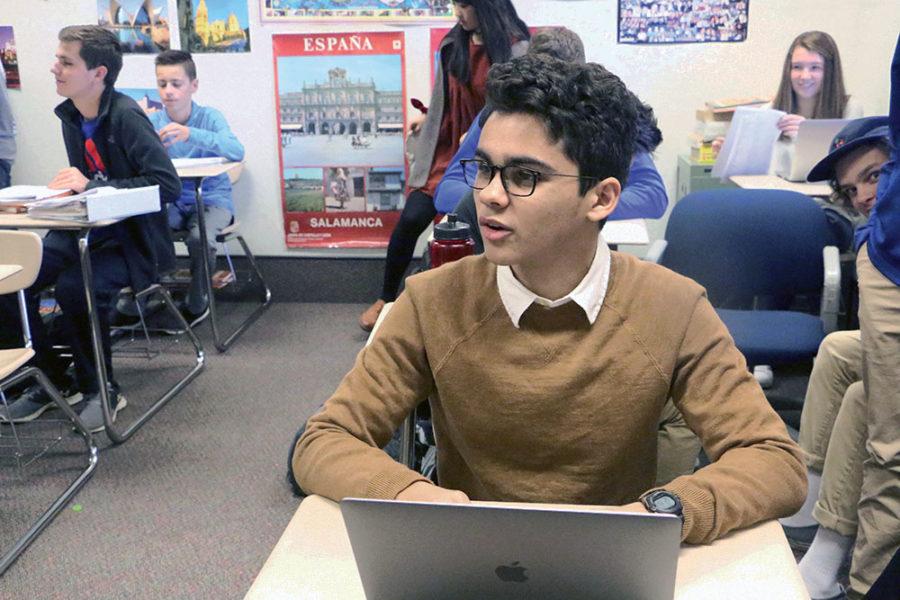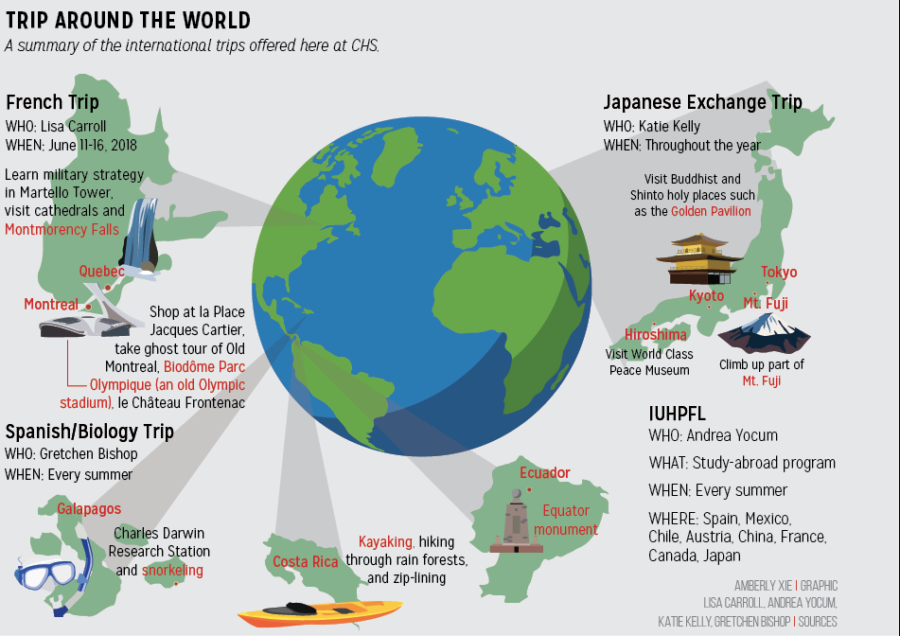 In order to graduate, every student at CHS must complete some type of language class, but unlike many, sophomore Ayman Bolad took his Spanish class experience to another level. He was a part of the summer 2017 school trip to Spain.
In order to graduate, every student at CHS must complete some type of language class, but unlike many, sophomore Ayman Bolad took his Spanish class experience to another level. He was a part of the summer 2017 school trip to Spain.
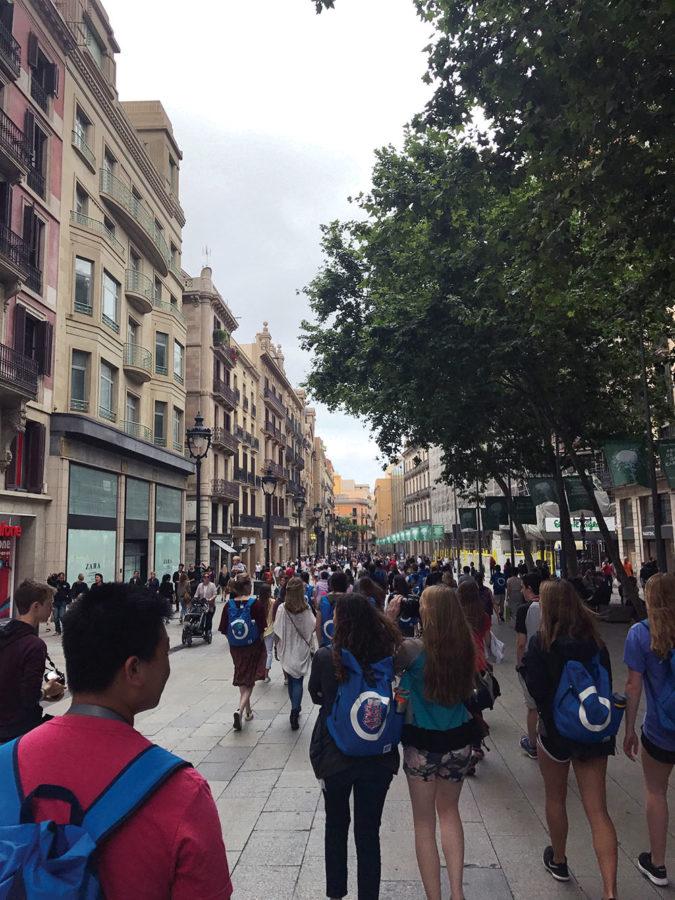
Members of the group who went on the Spain trip last year walk in Barcelona. According to Spanish teacher Gretchen Bishop, students are often more motivated after going on trips. She said, “My own son went on this last trip, and he wants to study abroad in college now.”
While directors offered the Spain trip to any student regardless of the world language course they take, Bolad said, “The most interesting part of the Spain trip was seeing how what we learned in Spanish class applied with native interactions and how the culture we learned in Spanish class was reflected through architecture and atmosphere.”
Gretchen Bishop, Spanish teacher and chaperone of last summer’s Spain trip, said the trips offer so much more than textbook learning. “My classroom is a window to show (students) things, but traveling is walking them through the door,” she said.
Likewise, Bolad said, “Reading out of a textbook is like a snapshot from history, whereas when you go there you get to see the culture and how tourists describe their lives.”
According to Bishop, these trips intend to offer something that is not available in the classroom setting by allowing students to be immersed in the Spanish language, speaking something they didn’t re
alize they knew, motivating and exciting them.
Students learn the general skills of speaking the foreign language in class, but Bolad said, “Being there helps to adjust your conversation flow and how you’re able to adapt to a faster mentality of speaking. Bridging that gap is what I got the most out of Spain.”
Visiting abroad also introduces other skills applicable beyond sitting in the classroom. Bishop said, “It gives (students) a different worldview; it also gives them confidence. I had this one girl that went down (to Spain). She was very shy, withdrawn (and) insecure, and she came back just a different person.”
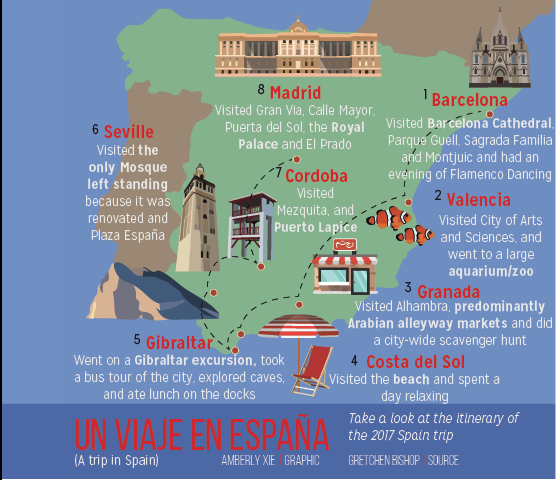 Will Ellery, the summer 2018 Europe chaperone and IB and block U.S. history teacher, said he sees the benefits of school-led trips beyond the aspect of language. Ellery, who has gone on every Europe trip for the last 13 years, said, “It makes the big world smaller overseas when you’re in a culture that has desires and interests the same as ours; it helps make a global citizen out of our students.”
Will Ellery, the summer 2018 Europe chaperone and IB and block U.S. history teacher, said he sees the benefits of school-led trips beyond the aspect of language. Ellery, who has gone on every Europe trip for the last 13 years, said, “It makes the big world smaller overseas when you’re in a culture that has desires and interests the same as ours; it helps make a global citizen out of our students.”
Bishop said traveling enables students to take the concepts they have learned back toward their future education. She said, “The first thing I notice after (the trips) is (students) are more interested in learning. I had a student on the trip who had quit Spanish, and he re-enrolled because he wants to work in Spain now. It’s not just a grade anymore.”
After taking part in this trip, Bolad said, “It’s a motivation to keep speaking the language knowing that one day it might come in use.”
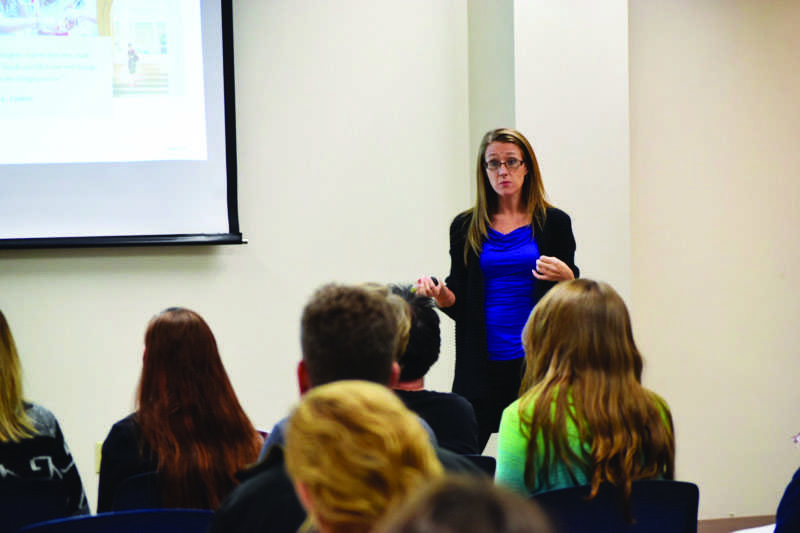
While Bolad’s experience was more language-based, Ellery said the annual Europe trip transcends any language barriers. “You don’t need to be German,” he said. “You need to be a student of humanity and understand concepts of mankind.”
Additionally Ellery said he has seen the incredible social aspects of trips abroad in which students form permanent friendships through an intellectual bond, a unique trait about trips abroad that cannot be found in a normal structured classroom.
Overall, Bishop said travelling halfway across the world with a group allows students to get more than they could on their own and the availability of school trips is crucial to student’s development.
Bolad said, “(The Spain trip) was really well coordinated and a really fun experience you couldn’t get by yourself or with (your) family.”




























![Keep the New Gloves: Fighter Safety Is Non-Negotiable [opinion]](https://hilite.org/wp-content/uploads/2024/12/ufcglovescolumncover-1200x471.png)







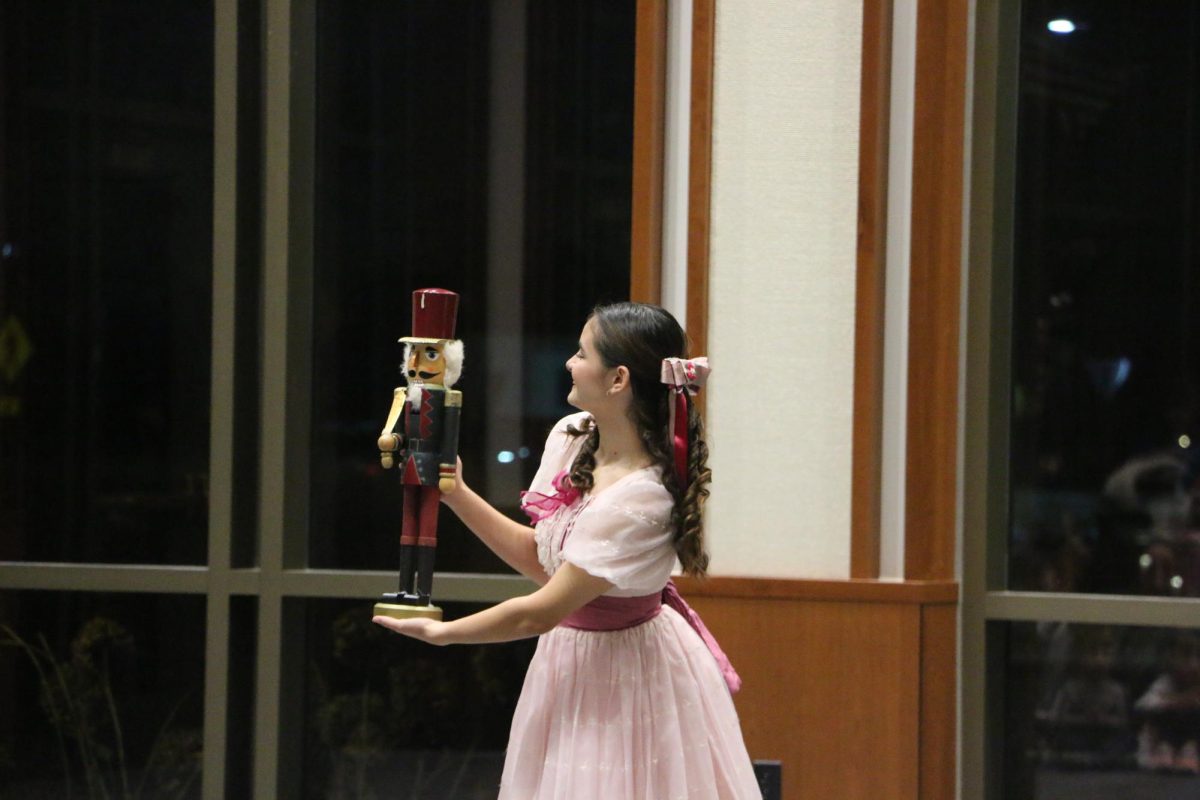








































![Review: "Moana 2": Is the storyline just as intense as advertised? [MUSE]](https://hilite.org/wp-content/uploads/2024/12/1-copy-1024x538-1.webp)
![Review: Celebrating its 15th season, “Bob’s Burgers” renders itself a fan favorite [MUSE]](https://hilite.org/wp-content/uploads/2024/12/bobs-burgers-tv.jpg)
![Review: “Family By Choice” is the perfect watch that encapsulates family, love and everything in between [MUSE]](https://hilite.org/wp-content/uploads/2024/12/family-by-choice-1.png)
![Review: “A Phở Love Story” is an exceptional and authentic representation of teenage Vietnamese-Americans [MUSE]](https://hilite.org/wp-content/uploads/2024/12/a-pho-love-story-9781534441941_hr-786x1200.jpg)
![Review: “And the War Came” by Shakey Graves is the perfect year-round album [MUSE]](https://hilite.org/wp-content/uploads/2024/12/IMG_2665.jpeg)
![Review in Print: Maripaz Villar brings a delightfully unique style to the world of WEBTOON [MUSE]](https://hilite.org/wp-content/uploads/2023/12/maripazcover-1200x960.jpg)
![Review: “The Sword of Kaigen” is a masterpiece [MUSE]](https://hilite.org/wp-content/uploads/2023/11/Screenshot-2023-11-26-201051.png)
![Review: Gateron Oil Kings, great linear switches, okay price [MUSE]](https://hilite.org/wp-content/uploads/2023/11/Screenshot-2023-11-26-200553.png)
![Review: “A Haunting in Venice” is a significant improvement from other Agatha Christie adaptations [MUSE]](https://hilite.org/wp-content/uploads/2023/11/e7ee2938a6d422669771bce6d8088521.jpg)
![Review: A Thanksgiving story from elementary school, still just as interesting [MUSE]](https://hilite.org/wp-content/uploads/2023/11/Screenshot-2023-11-26-195514-987x1200.png)
![Review: "When I Fly Towards You", cute, uplifting youth drama [MUSE]](https://hilite.org/wp-content/uploads/2023/09/When-I-Fly-Towards-You-Chinese-drama.png)
![Postcards from Muse: Hawaii Travel Diary [MUSE]](https://hilite.org/wp-content/uploads/2023/09/My-project-1-1200x1200.jpg)
![Review: "Ladybug & Cat Noir: The Movie," departure from original show [MUSE]](https://hilite.org/wp-content/uploads/2023/09/Ladybug__Cat_Noir_-_The_Movie_poster.jpg)
![Review in Print: "Hidden Love" is the cute, uplifting drama everyone needs [MUSE]](https://hilite.org/wp-content/uploads/2023/09/hiddenlovecover-e1693597208225-1030x1200.png)
![Review in Print: "Heartstopper" is the heartwarming queer romance we all need [MUSE]](https://hilite.org/wp-content/uploads/2023/08/museheartstoppercover-1200x654.png)




